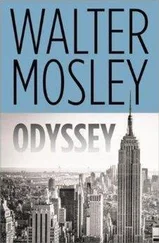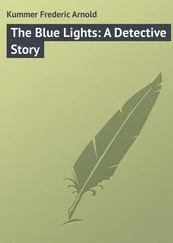“She remembered that, huh?”
“She told me all about you, Mr. Charm. She told me a story to tell you when we saw each other. A story that she heard in Alabama.”
Lythe Charm smiled with broad anticipation, “And what story was that?”
“Excuse me, Ebony,” Renee said.
“Yes, ma’am.”
“Is that little bag your suitcase?” She was referring to the beat-up leather bag, the size of a school satchel, that the young woman carried with her.
“Yes, ma’am. I just got into town. I was going to find a Y to stay at, but I wanted to drop by here and say hello first.”
“Well, you take that bag upstairs and put it in the third room on the right. That’s Nesta’s room. You put it down up there and clean up, and I’ll make us all some supper.”
“But I wanna hear Nesta’s story she sent me,” Lythe Charm complained.
“Don’t worry, Uncle,” said the dutiful and dour Renee Ferris. “Ebony’ll spend the night and tell us everything about your girl.”
“Was it a planet?” Lythe Charm asked the young woman who called herself Ebony.
“No, no, that’s not what they called it,” she answered. “It was more like a giant stone that was once alive but then became the home to its own children.”
“Like a shell,” he said.
“Yes.”
The black woman’s smile was brilliant and white. She had been telling Lythe Charm a story that she said she’d learned from his granddaughter who had, in turn, learned it from a little-known tribe of American Indians called the ArShoni. The story Nesta was telling was a fragment of the creation story that she had inherited from the blue light that infused her with knowledge and power.
“... for more years than man can count,” Nesta continued, “bright forms of life that were like animals and flowers and insects and fish all in one grew out of the ground and bathed in the light of a rainbow-colored star—”
“Were they on a planet then or was that on the big rock?” Lythe Charm asked, hungry for the words of his long-gone granddaughter.
“That was on the planet, before things changed,” Nesta said. “The life-forms grew and intermingled and multiplied and changed. Because on this planet the fish and beasts could speak and mate; all life there was equal and respectful.”
“What did they eat?” the old man asked slyly. “If they all respected each other, even the flowers and the trees, then what could they eat?”
“They lived on the light from the rainbow star,” the young woman said. “The radiant energy of the star fed them. And for eons they grew and multiplied and changed. After many millions of years they began to fly and grow higher and higher until some had completely left the planet and flew closer and closer to the sun, looking for more and more energy because the great joy among these far-off folk was to bathe in the light of the sun and to grow.
“These great flying beasts had within them chambers of quartz that stored light in patterns that held all of the wisdom of all the life-forms that were once planet-bound. Then they began to multiply by placing the seed of their physical being on lifeless chunks of matter in space and then bathing those seeds with the light from within their deep quartz caverns.”
“And why was that?” Lythe Charm asked. He was feeling younger and stronger just talking to the strange-looking woman. There was something about her that was familiar, but Lythe couldn’t seem to put his finger on it. “Why would they have to shine light on their own seeds if there was a sun still shining?”
“Because their light contained memories and instructions on how to grow. The seeds had the power of life, but in the light was their souls’ purpose.”
“Kinda like Sunday school in a flashlight, huh?” Lythe asked.
“A little bit. But as time went by, the space creatures got larger and larger. Soon they were as big as moons and there were millions of them. They absorbed all the energy of the star and then floated out toward new stars. By then they were as large as planets. Their hard external shells covered mighty engines that they had for both their heart and brain. Millions of years passed, and the planets of life spread out across the universe. And as they moved, now and again, they would deposit their seed on likely-looking planets. Emanating—”
“Say what?” Lythe Charm, whose eyes were looking younger, asked.
“Emanating. That means ‘coming out from.’ ”
“Oh, yeah. Uh-huh, I see.”
“Anyway, emanating from the seed was a soft music, and if another of their celestial brethren would pass by, they would hear it and shine their light where the seed had fallen. That way, information and life could pass between the stars and new life could evolve.”
“But what if the seed was dropped, but nobody heard the signal and no light came?” Lythe asked. She could tell that he didn’t believe a word of the story but loved hearing it. It was just as if Nesta had never gone, as if she were still there telling him about what she had learned in her late-night reading.
“We are the seeds, Mr. Charm,” Nesta/Ebony said. “Just seeds waiting for water in order to grow.”
“You mean, we aren’t the top ones in the animal world?” the old man asked. He seemed a little sad.
“No, Gramp,” she said softly. “We’re just empty husks, like, waiting for the light of life to enter us.”
“You are my little girl, aren’t you?”
“I love you,” she said. Then she bit hard into her bottom lip and kissed her mother’s father in a way that he had not been kissed in many years.
The view from the mountaintop was all that Gerin Reed ever wanted. Whenever his eyes chanced upon the deep blue Pacific or down the steep valley of pines, he stopped whatever he was doing, forgot where he was going to, and stared — sometimes for up to an hour. Many things distracted him. His children making up games based on how fast they could run or how well they could remember, the bottle of urine rotting and congealing on the back porch, the static between stations on the radio.
Karen had gone down with the children to Jason and Bridgette Sandler’s place. The Sandlers were their closest neighbors, two miles distant. Jason worked for a lumber company, and Bridgette took care of their kids. Gerin had seen his wife and Jason in the woods together. He knew that he couldn’t satisfy her needs and didn’t mind too much. All he wanted from her was her company and her laughter with the children. Sometimes he would wake up in the night and watch her sleeping. He once counted 3,700 of her breaths.
Aspiration , he thought while she slept, maybe dreaming of her lover down the hill.
Gerin had a slender paperback book in his pocket, The Prince by Machiavelli. The ideas didn’t mean much to him, but the words being read out loud made a kind of music that Gerin liked to set free in the forest.
He sang out in the woods, hoping for an echo. He wanted to hear something. Something that vibrated in his own heart and mind. He felt like a child in those woods, sure that there were other children laughing and playing there too. But they were hiding from him. It was a cruel game of hide-and-seek but Gerin never lost his hopeful heart. He knew that they would come out for him someday.
He could hear a car coming up the dirt road. Gerin worried that it might be Bridgette. Sometimes she came up to seduce him while Jason and Karen took care of the kids. She liked to go skinny-dipping, pretended that it was innocent enough, that she and her husband did it with people all the time. Gerin did what she asked but was continually distracted by cloud patterns wrapped in the ripples of the pond. He liked to look at Bridgette’s round belly and swirling pubic hair, but he was never aroused.
Читать дальше












